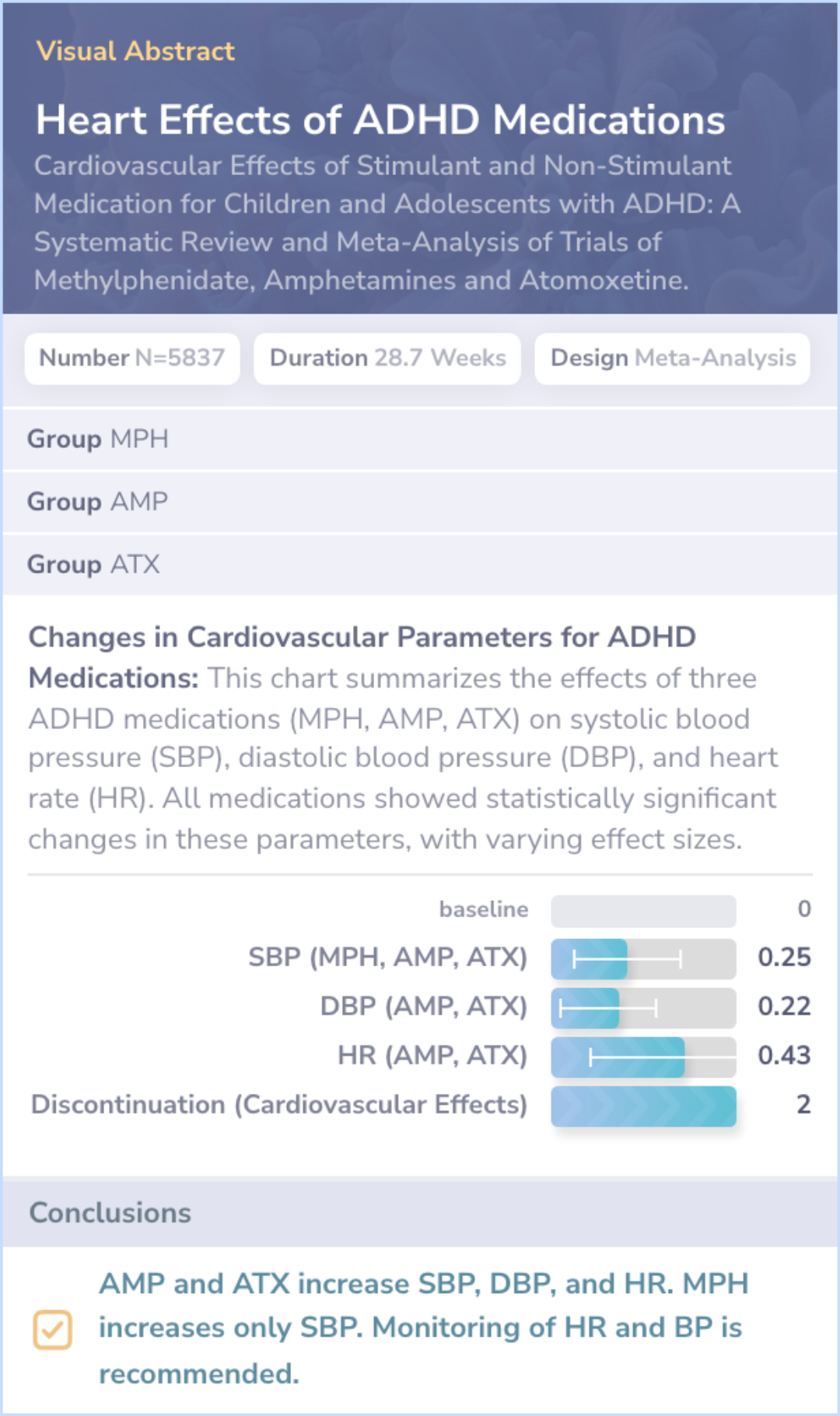Trending ADHD Papers
Visual Abstract
Long-term safety of methylphenidate in children and adolescents with ADHD: 2-year outcomes of the Attention Deficit Hyperactivity Disorder Drugs Use Chronic Effects (ADDUCE) study
Long-term safety of methylphenidate in ADHD
December 9, 2024
author
Man KKC, Häge A, Banaschewski T, Inglis SK, Buitelaar J, Carucci S, Danckaerts M, Dittmann RW, Falissard B, Garas P, Hollis C, Konrad K, Kovshoff H, Liddle E, McCarthy S, Neubert A, Nagy P, Rosenthal E, Sonuga-Barke EJS, Zuddas A, Wong ICK, Coghill D
journal
Lancet Psychiatry
Date Published
2023 May
Why link to a visual abstract?
What is a visual abstract?
Original
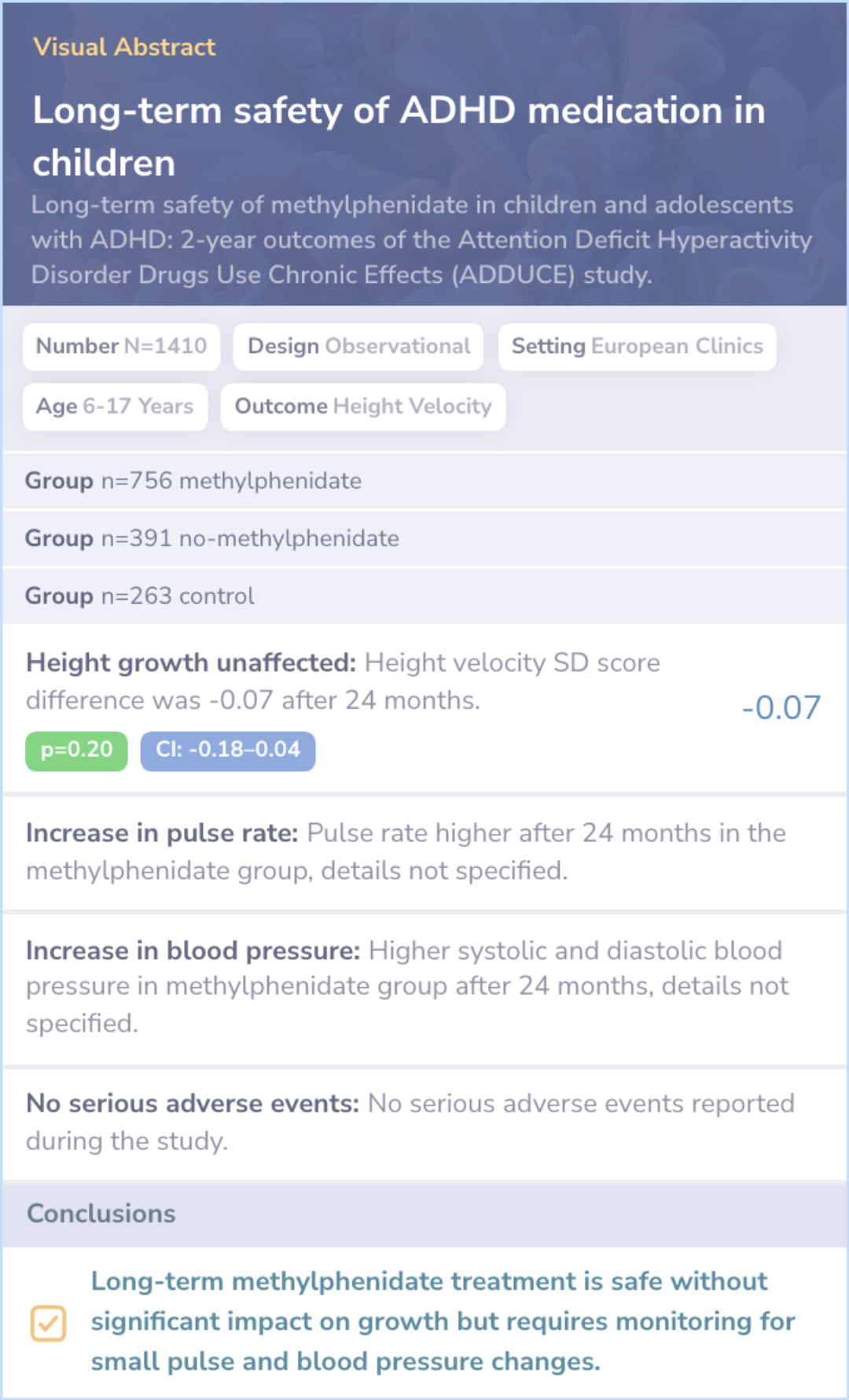
Study Summary
🔬
What They Studied
The researchers aimed to investigate the long-term safety of methylphenidate concerning growth, psychiatric, neurological, and cardiovascular health in children and adolescents with ADHD over a 2-year period.
💡
What They Found
The study found no significant reduction in growth or increased risk of psychiatric or neurological issues, but observed slight increases in pulse and blood pressure in those treated with methylphenidate.
📚
What This Means
These findings suggest that long-term use of methylphenidate aligns with the current evidence, showing no significant impact on growth, though cardiovascular metrics like pulse and blood pressure require monitoring.
Study Overview
Background & Objectives
Methylphenidate, often known as Ritalin, is commonly used as a treatment for ADHD in both children and adults. Acting by increasing levels of key neurotransmitters in the brain, this medication is prescribed to individuals aged six and older. It's crucial to understand how this treatment impacts young patients' growth and health.
In this context, a study aimed to explore the long-term safety of methylphenidate over two years, focusing on growth, psychiatric and neurological health, and heart function in children and adolescents with ADHD. Participants included both those starting on the medication and those not taking it, alongside a control group without ADHD.
In this context, a study aimed to explore the long-term safety of methylphenidate over two years, focusing on growth, psychiatric and neurological health, and heart function in children and adolescents with ADHD. Participants included both those starting on the medication and those not taking it, alongside a control group without ADHD.
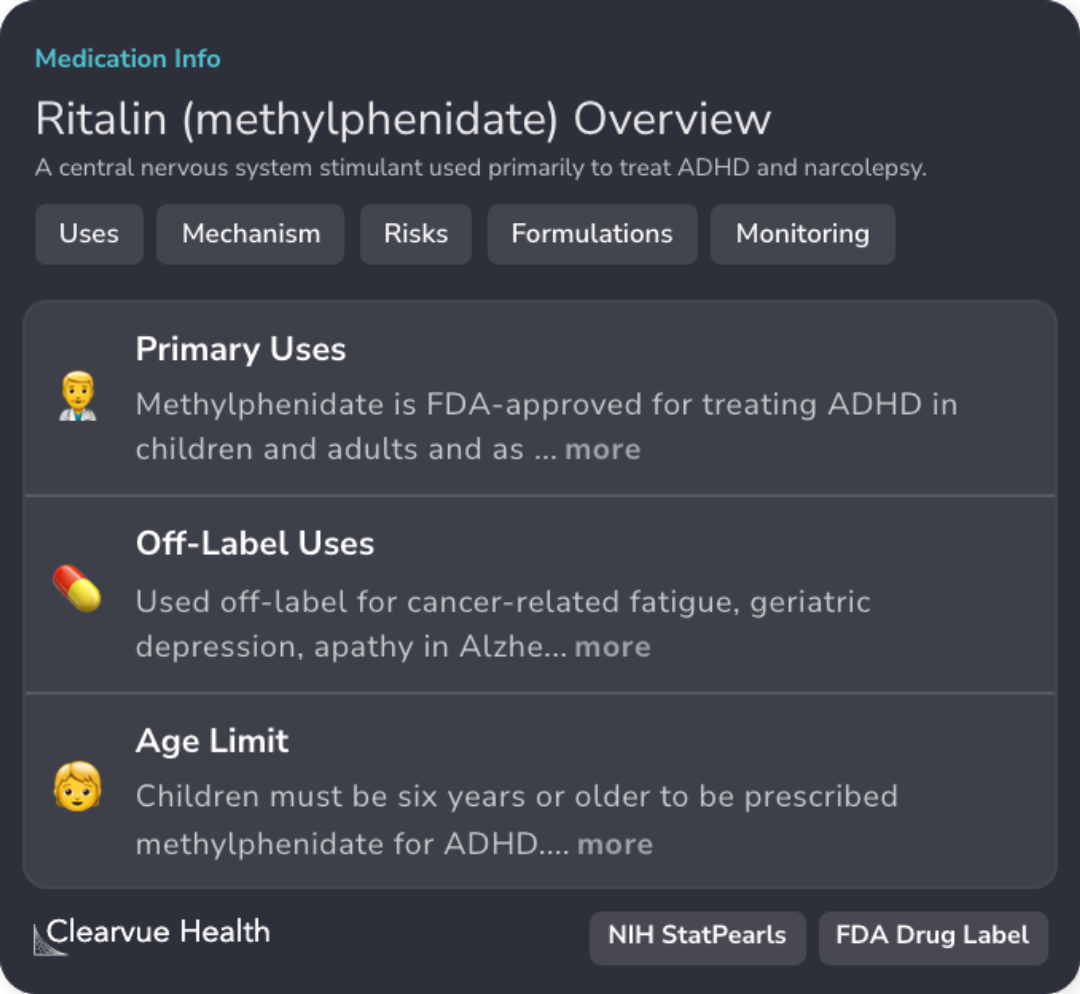
Abstract: background
The aim of this study was to investigate the safety of methylphenidate over a 2-year period in relation to growth and development, psyc...more
Study Summary
Methods
The study was a naturalistic and long-term effort under the ADDUCE program, conducted in 27 centers across Europe. It included children and teens aged 6-17, split into three groups: those starting methylphenidate, those with ADHD not starting any medication, and kids without ADHD.
Participants had no previous ADHD medication history. Growth rates, specifically height increases, were the main focus. Exclusion applied to those who had already used ADHD drugs, while those on other psychotropic drugs could still participate.
Participants had no previous ADHD medication history. Growth rates, specifically height increases, were the main focus. Exclusion applied to those who had already used ADHD drugs, while those on other psychotropic drugs could still participate.
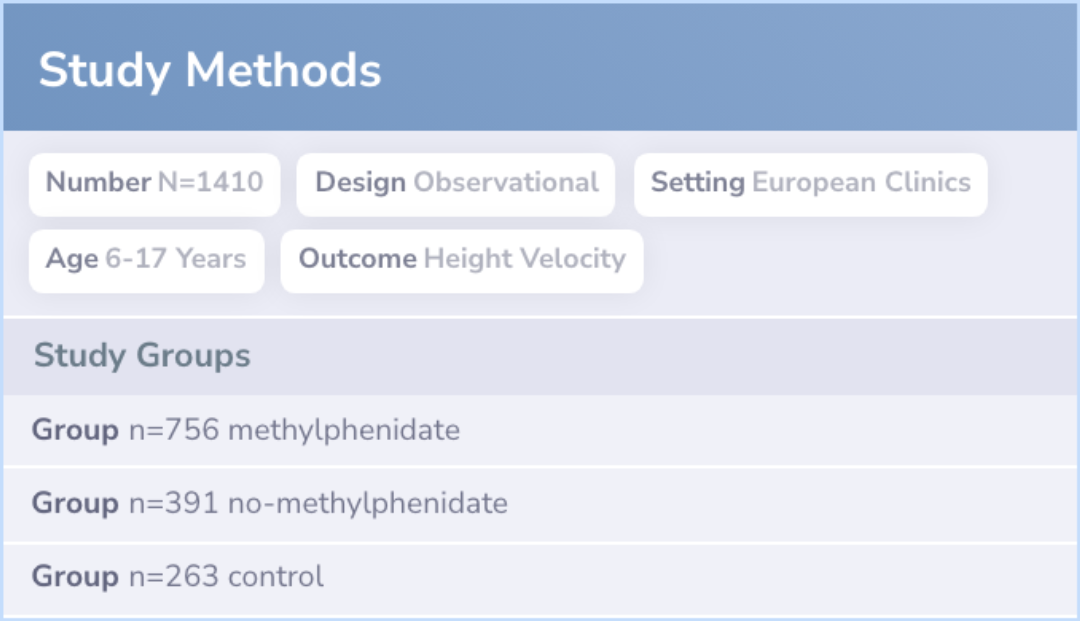
Abstract: methods
We conducted a naturalistic, longitudinal, controlled study as part of the ADDUCE research programme in 27 European child and adolescen...more
Study Results
Results
The study involved 1,410 youngsters, with most being male and predominantly White. The average age was roughly 9 years. Participants on methylphenidate showed differences compared to those not on the medication. After adjustments, there was little evidence showing the drug impacted growth or increased psychiatric or neurological issues.
However, heart-related measures like pulse and blood pressure were slightly elevated in the medication group but no serious health crises occurred during the study. Overall, this suggests methylphenidate’s effects were noticeable but not severe over the two years.
However, heart-related measures like pulse and blood pressure were slightly elevated in the medication group but no serious health crises occurred during the study. Overall, this suggests methylphenidate’s effects were noticeable but not severe over the two years.
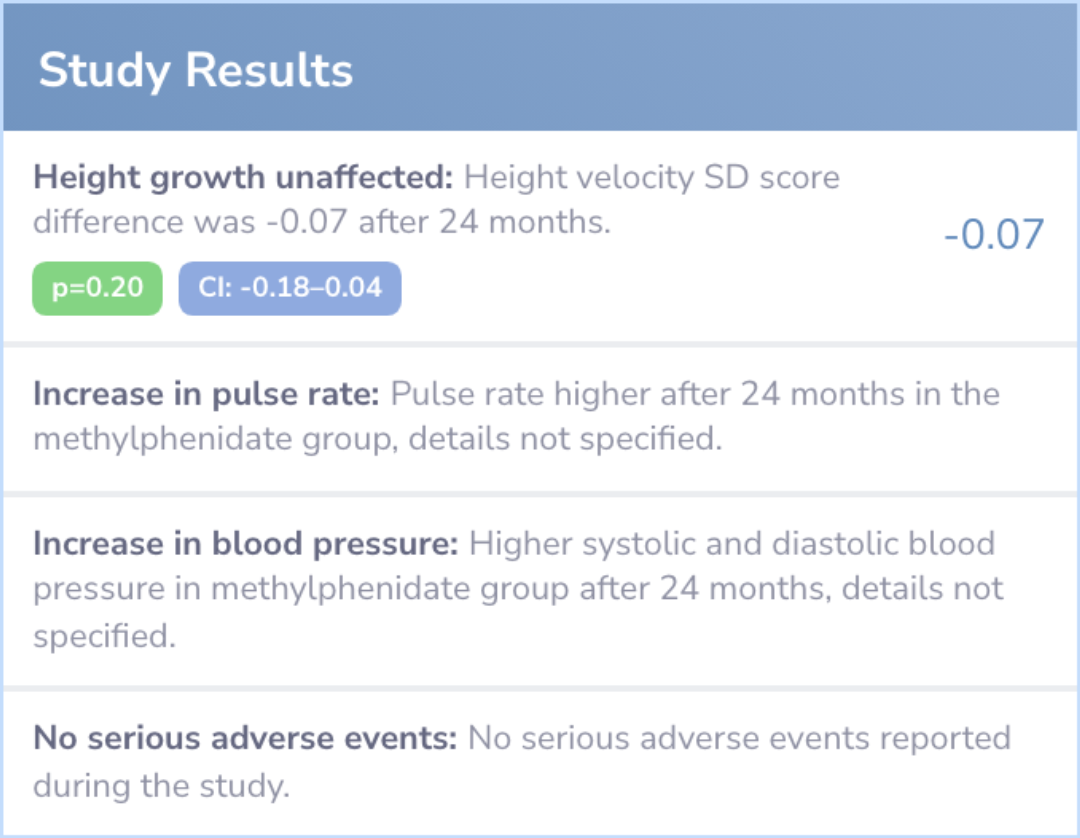
Abstract: results
Between Feb 01, 2012, and Jan 31, 2016, 1410 participants were enrolled (756 in methylphenidate group, 391 in no-methylphenidate group,...more
Study Summary
Conclusions
The findings suggest using methylphenidate for two years is generally safe, without observable negative impacts on physical growth in children. The study didn't find evidence that the drug hindered growth or led to heightened psychiatric concerns.
Nonetheless, slight increases were noted in heart-related measures, underscoring the need for ongoing monitoring of pulse and blood pressure during treatment. This ensures any small changes are detected and managed effectively, maintaining overall health stability.
Nonetheless, slight increases were noted in heart-related measures, underscoring the need for ongoing monitoring of pulse and blood pressure during treatment. This ensures any small changes are detected and managed effectively, maintaining overall health stability.
Abstract: conclusions
Our results suggest that long-term treatment with methylphenidate for 2 years is safe. There was no evidence to support the hypothesis that methylphenidate treatment leads to reductions in growth. Methylphenidate-related pulse and blood pressure chan...more
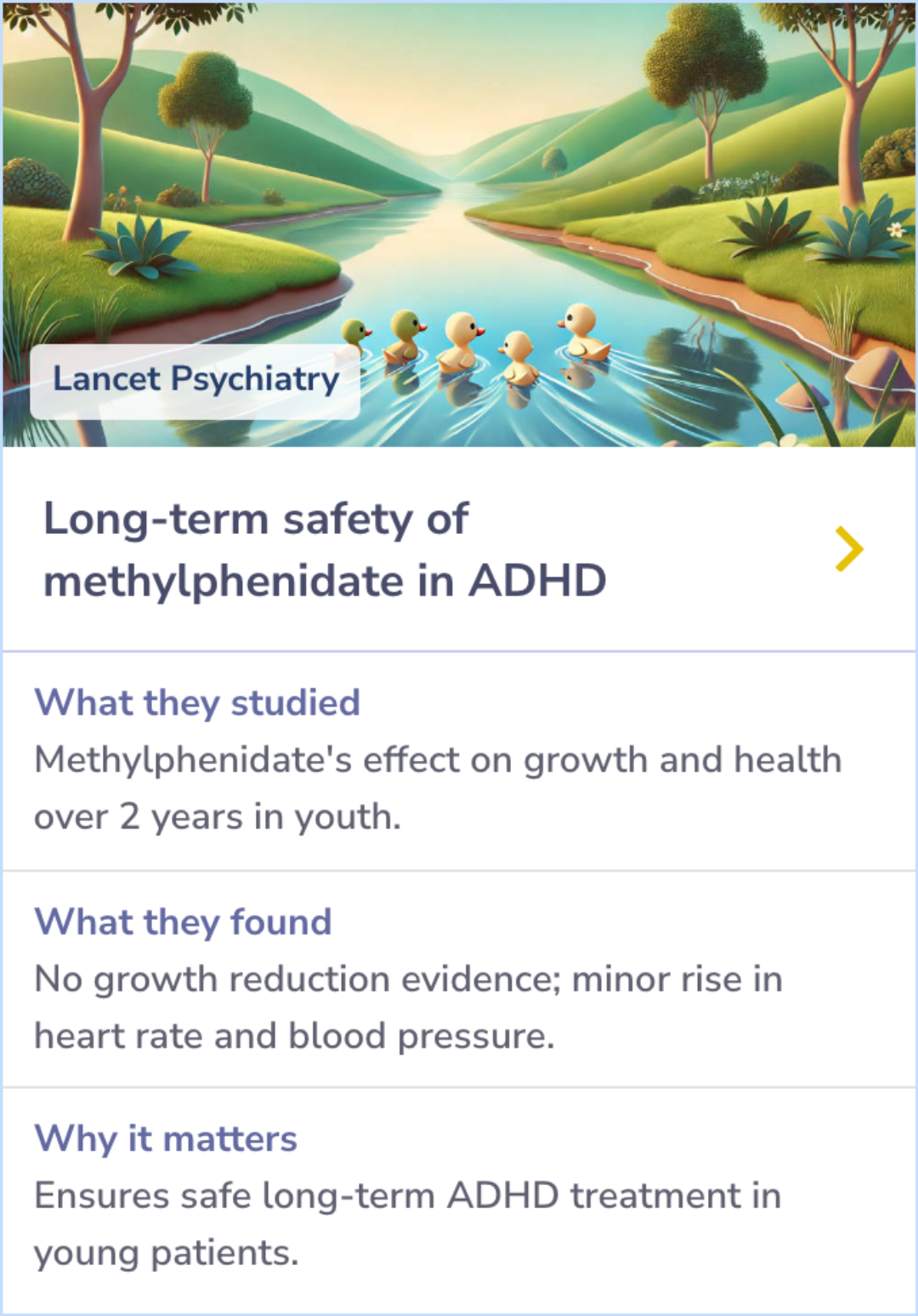
Clinical Guidelines
Guidelines suggest that methylphenidate is recommended as the first-line treatment for preschool children with ADHD, noting limited research for nonstimulant options.
Consistent use in children 7 to 10 years old may result in temporary growth suppression without growth rebound over three years.
Additionally, careful consideration is needed for children with a history of substance use or pre-existing psychiatric conditions like bipolar disorder.
Consistent use in children 7 to 10 years old may result in temporary growth suppression without growth rebound over three years.
Additionally, careful consideration is needed for children with a history of substance use or pre-existing psychiatric conditions like bipolar disorder.
Literature Review
Storebø et al, 2018
Core Insight:The comparison paper highlights potential serious and non-serious adverse events from methylphenidate, contrasting the main paper's findings of no significant adverse growth or psychiatric effects.
What It Adds:
Adverse Event Warning: The comparison paper reports higher risks of serious events like arrhythmia.
Non-Serious Events: Reports of insomnia, appetite decreases contrast with main paper's findings.
Shared Themes:Both papers examine methylphenidate's effects on children with ADHD.
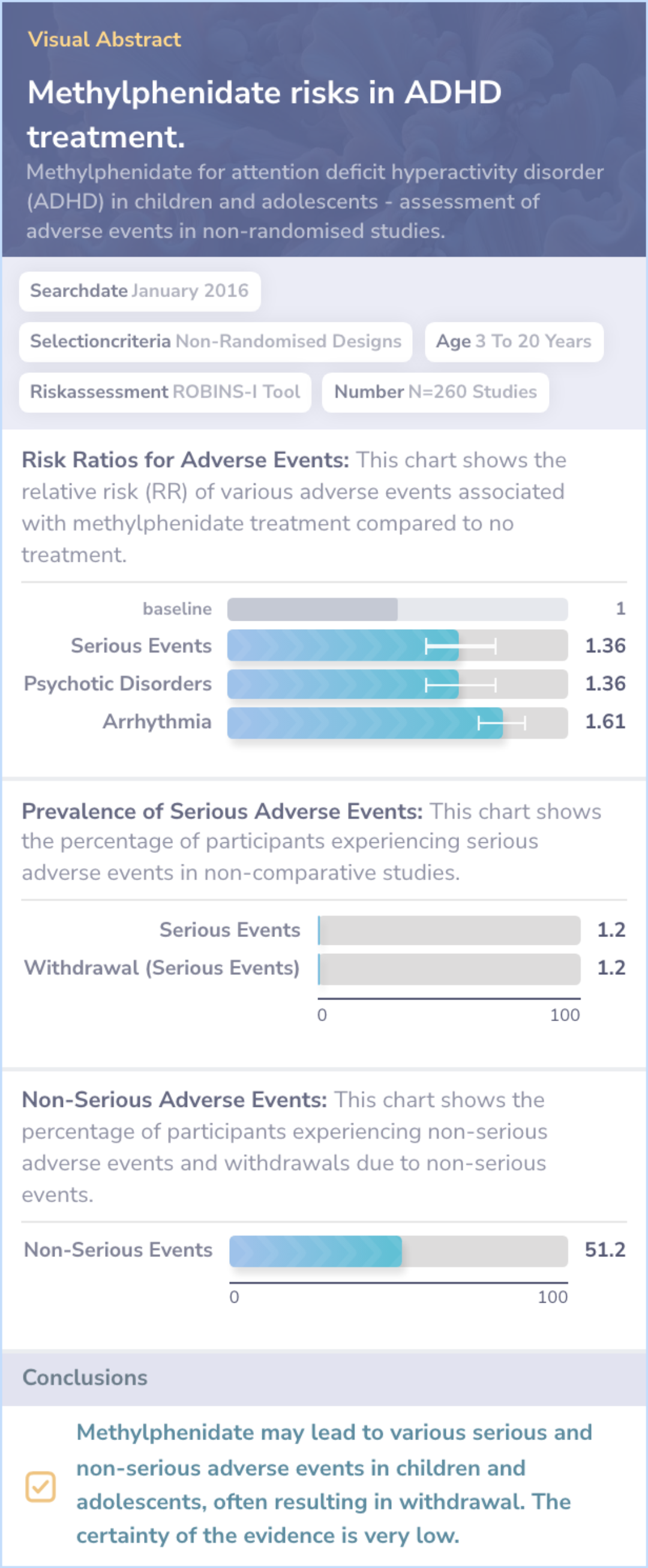
Literature Review
Hennissen et al, 2017
Core Insight:This paper examines cardiovascular effects of ADHD medications, including Methylphenidate.
What It Adds:
Cardiovascular Insights: Finds small blood pressure rises with ADHD meds.
Monitoring Recommendation: Suggests regular heart rate and blood pressure checks.
Key Differences:Main paper focuses on growth and overall health, while this paper targets cardiovascular impacts.
Shared Themes:Both studies agree Methylphenidate affects blood pressure, requiring monitoring.
